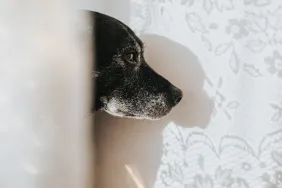Why Do Dogs Like Belly Rubs? Do All Dogs Like Them?

Every dog owner knows the drill: dog rolls over his back, raises all four paws in the air without a care in the world, shows off belly, and eagerly waits for a good belly rub session that will leave their heart content. But, why do dogs like belly rubs? And, do all dogs like belly rubs? Here’s what you need to know.
Why do dogs like belly rubs so much?
Most dogs love getting their bellies rubbed primarily due to the feel-good hormones — known as endorphins — that their bodies release in the process.
According to a study published in the Taylor & Francis Journal, a dog’s abdominal region contains numerous sensitive nerves and touch receptors that get stimulated instantly during a belly rub session. This, in turn, triggers the release of oxytocin, a powerful endorphin associated with the sensation of pleasure.
As the oxytocin levels increase, the level of Cortisol — a hormone responsible for stress in both dogs and humans — reduces. Feeling relaxed and stress-relieved is definitely something your dog would want to experience again, and again, and again.
@media (min-width: 0px) and (max-width: 749px) { .pb_prebidjs_300x250_a__wrapper { min-height: 250px; } } @media (min-width: 750px) { .pb_prebidjs_300x250_a__wrapper { display: none; } }
Do all dogs like belly rubs?
The general assumption is that all dogs love their bellies stroked. However, Pet MD reveals that dogs sometimes don’t like belly rubs. It’s important to remember that every dog is different; not all are fans of these rubs.
This may be due to various reasons, such as pain in their belly or wanting to protect their personal space.
If you’re unsure whether your dog wants you to continue rubbing their belly, pay attention to their body language. A dog that’s enjoying the petting session will look relaxed. On the other hand, a pup who’d want you to stop will appear rather tense.
In most cases, a dog who doesn’t enjoy their tummy scratched will likely tuck their tail between their legs, have their ears pointed backward, avoid eye contact, and try to get away.




